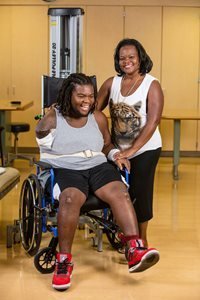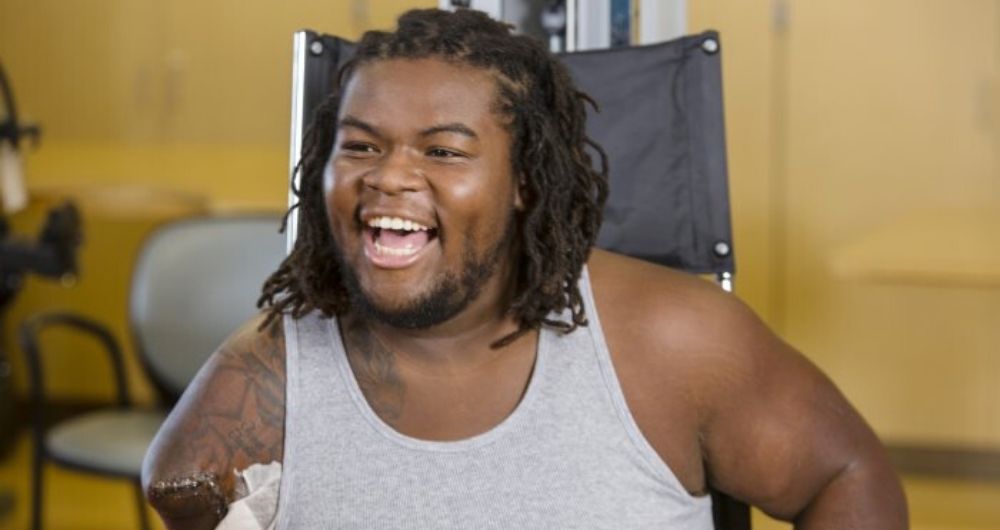Donald Speed, Jr. will never forget his 21st birthday.
That was the day he received a 3-wheeled motorcycle. But birthday excitement soon turned to panic as he was driving to his girlfriend’s house and the power steering went out, the wheel locked up, and he had to slam on the brakes of the 3-wheeler. Then Speed had to make a split second decision to avoid two poles directly in his path. Instead of hitting the poles, he turned and slammed into a mound of dirt – flipping the vehicle.
 He crawled out from under the motorcycle with blood gushing from his arm. Good Samaritans stopped and helped – one a former emergency medical technician who applied pressure to his arm and called 911.
He crawled out from under the motorcycle with blood gushing from his arm. Good Samaritans stopped and helped – one a former emergency medical technician who applied pressure to his arm and called 911.
Speed was in immense pain as he was taken to Community Regional Medical Center’s Table Mountain Rancheria Trauma Center – the only Level 1 Trauma Center between Los Angeles and Sacramento.
“I knew I was probably going to lose my arm,” said Speed, a former college football player.
As he suspected the damage to his arm was so severe it had to be amputated to save his life. At Community Regional, Speed moved from the trauma center to the intensive care unit where he was on a ventilator for several days.
His injuries included a cracked pelvis, several fractured vertebrae and a lower rib, a hairline fracture on his foot and a small laceration to his kidney.
“Even when he was on the ventilator, he was being strong for everyone else,” said his mother Yolanda Speed. “He was keeping people going even when he was at his worst.”
Speed’s family and friends were right at his bedside providing the love and support he needed. Eventually Speed, at that time a defensive coordinator at El Capitan Middle School in Fresno and a defensive line coach for the varsity football team at Central High School east campus, healed enough to move to the Leon S. Peters Rehabilitation Center.
There he continued his recovery. Physical and occupational therapists worked with Speed to help him learn to navigate life without the use of his right arm, gain strength and get back his independence.
“Inpatient rehabilitation services, like those provided by the Leon S. Peters Rehabilitation Center, provide newly disabled patients the opportunity to regain their independence so they can go home with their families,” said Jeff DiMarco, rehabilitation referral liaison. “We use a team approach to rehearse with patients and their families all of the self-care things they normally do at home. So once they get home they can stay there.”
“It means the world to have a rehab team like this,” said Speed. “Without them I’d still probably be in a wheelchair not being able to stand up and do a whole lot of things if it wasn’t for them. They’re the reason for my success right now – them and my family. Without those two, I would be in a whole different type of place and probably a whole different mindset.”
DiMarco said that the therapy doesn’t end when a patient leaves the hospital, “Before discharging them home, we schedule more therapy for them outside the hospital where they’ll hopefully continue to become even more independent for all of their life activities.”
Speed knows he has a long road ahead but he has a positive outlook. He credits that in part to his work with his family, assisting mentally disabled adults in Fresno.
“Disabilities won’t stop you from having a quality of life,” Speed said.
Both Speed and his mother say they will never forget those who helped him in his time of need.
“Community Regional felt like a home away from home. He had a support system there.” said his mother. “It was welcoming for his friends and family to be involved while he was in the hospital,” Yolanda said.
And his mother said she’s proud of her son’s strength, determination and wonderful spirit.
“I can do a lot of things on my own now,” Speed said. Which a year after his ordeal, includes attending college and helping coach football at Fresno High School with his father Donald Speed, Sr.
Jennifer Avila-Allen reported this story. Reach her at MedWatchToday@CommunityMedical.org.
Wednesday, August 31, 2016, 09:00 PM
Motorcycle accident doesn’t slow down Donald Speed’s positive attitude
Donald Speed, Jr. will never forget his 21st birthday. That was the day he received a 3-wheeled motorcycle. But birthday excitement soon turned to panic as he was driving to his girlfriend’s house and the power steering went out, the wheel locked up, and he had to slam on the brakes of the 3-wheeler. Then Speed had to make a split second decision to avoid two poles directly in his path. Instead of hitting the poles, he turned and slammed into a mound of dirt – flipping the vehicle.

We use cookies and other tools to optimize and enhance your experience on our website. View our Privacy Policy.


